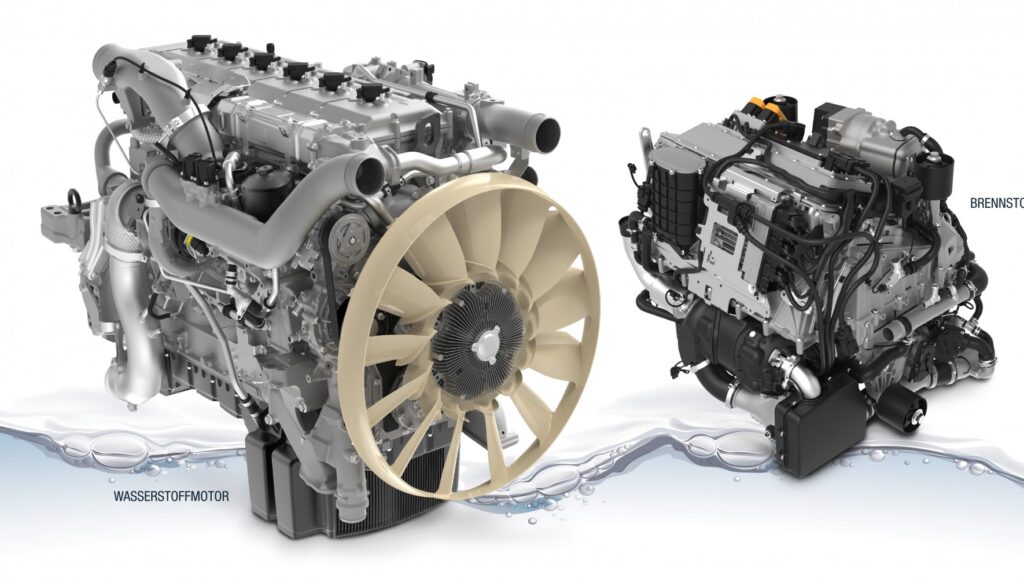The Volkswagen subsidiary MAN Truck & Bus intends to give greater priority to hydrogen in its electrification strategy in future, in addition to the development and manufacture of battery-powered commercial vehicles. The Munich-based company will be testing hydrogen-powered vehicle prototypes as early as next year.
MAN says that the purpose of the prototypes is to test both a fuel cell and an H2 combustion engine. While the first variant will be the classic H2 drive with fuel cells, electric motor and battery and a range of 800 kilometres, a hydrogen engine is a combustion engine that is operated with hydrogen as fuel based on the oxyhydrogen gas reaction. Although the system does not emit carbonaceous pollutants, it does emit higher concentrations of nitrogen oxides. MAN sees the H2 internal combustion engine as a bridging technology towards the fuel cell since the solution is “more readily available and robust due to the well-known basic technology”.
MAN has not revealed further details about how the hydrogen for either the combustion engine or the fuel cell is to be stored onboard the vehicles. Currently, pressure storage at 350 bar is standard in commercial vehicles. In mid-September, Daimler Trucks announced that they were also working on a fuel cell truck they are calling the GenH2 Truck. Here Daimler is relying on the storage of liquid hydrogen, which has not been widely used in mobile applications so far, and which should enable higher energy densities than with gaseous pressure storage. Liquid hydrogen, known as LH2, must be stored at temperatures of -253 degrees Celsius.
The plan is to begin tests in cooperation with selected customers in 2023/24. MAN is aiming to test the entire hydrogen ecosystem in transport logistics. “We take our responsibility towards the environment and society very seriously, so MAN Truck & Bus is using a lot of energy for the development of alternative drive systems,” emphasises Frederik Zohm, Executive Board member for Research & Development. “Hydrogen can be an interesting solution here, but then infrastructure needs to be significantly expanded. We are happy to make our contribution by developing the right vehicles – as we demonstrate with our roadmap”.
The manufacturer already has battery-powered vehicles in its product range, namely the Lion’s City E city bus, the eTGE and the eTGM distribution truck. “The all-electric truck of the new truck generation will hit the road from 2023,” MAN announced.
Meanwhile, MAN is announcing several partnerships to set up fuel cell vehicle test field for logistics applications. For example, the Volkswagen commercial vehicle subsidiary wants to test hydrogen for use in long-distance road haulage as part of what is being called the Bavarian fleet with Bavarian infrastructure operators and freight partners. Initial talks with the Bavarian state government are already underway.
The cooperation with universities is also planned, namely with the Friedrich-Alexander University Erlangen-Nuremberg (FAU) and the Technical University Nuremberg (THN). The focus of the cooperation is on research and development in the field of hydrogen-based vehicle drives. The partners will operate a joint laboratory directly on MAN’s Nuremberg plant premises. “With this Hydrogen Campus, what right now is the MAN diesel engine plant is laying the foundation for a successful transformation towards alternative drives,” says the company.
The work on the Hydrogen Campus will also cover the entire H2 value chain: from the environmentally friendly production of hydrogen to distribution and infrastructure, from energy conversion back to electricity to the application of the technology in vehicles for customers. While FAU will focus on basic research, and THN will contribute its strengths in application-oriented research, MAN will focus on the implementation of research results. The two universities are not the only partners in this endeavour, important institutional research partners in the region also include the Helmholtz Institute for Renewable Energy (HI-ERN), Energie Campus Nürenberg (EnCN), the Nuremberg Campus of Technology, and two Fraunhofer Institutes: IIS (Institute for Integrated Circuits) and IISB (Institute for Integrated Systems and Device Technology).
The campus will also fulfil another important function. While the primary function is researching and developing hydrogen technology in vehicles and infrastructure, the university campus will also be able to provide qualified workers for the hydrogen eco-system in the future with an already established employer whose products have been co-developed with the campus itself.
The cooperation between MAN Truck & Bus, the two German universities and other partners is embedded in Bavaria’s Hydrogen Strategy Hydrogen.Bavaria (H2.B). It aims to make the Nuremberg metropolitan region a European competence centre for hydrogen propulsion systems.
Source: Electrive.
